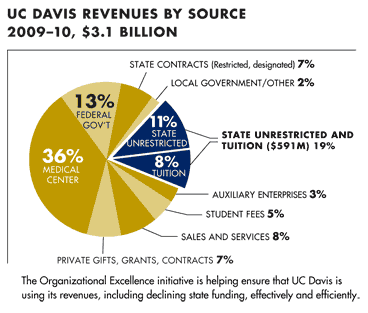The vision: Organizational excellence
UC Davis will provide an efficient and service-focused administrative infrastructure that effectively facilitates and advances its academic excellence.
UC Davis announced the Organizational Excellence initiative in 2010 as a strategic approach to improving the efficiency and effectiveness of its administrative processes, helping ensure a better future for the university.
“Academic excellence cannot be achieved unless the academic units are supported by an administration that is lean, effective, transparent, service-oriented and innovative,” Chancellor Katehi said at the time of the announcement.
The initiative is systematically improving services that the campus community depends on and, when appropriate, re-thinking some of the fundamental assumptions under which the university has been operating. With the state fiscal crisis continuing, the Organizational Excellence initiative is setting aggressive goals for process improvement and organizational change.
One element of the initiative involves realigning the university’s administrative processes by implementing a shared service center for select activities in finance, human resources, information technology and payroll. Five university divisions will participate in the initial implementation: Administrative and Resource Management, Information and Educational Technology, Offices of the Chancellor and Provost, Student Affairs and University Relations. Through the implementation of shared service centers, administrative service delivery will be consolidated, streamlined, re-engineered and standardized. This, along with the implementation of enabling technologies, will improve customer service, increase the quality and consistency of information delivery, better manage and control risk, and reduce administrative costs by up to 20 percent annually.
Other goals of the Organizational Excellence initiative include, but are not limited to, assessing the effectiveness of several administrative organizations through administrative unit reviews, adopting a mindset of continuous process improvement, aligning staff as closely as possible to academic programs and initiating strategic energy-efficiency programs.
The Organizational Excellence implementation is based on recommendations from the Organizational Excellence Steering Committee and from the Budget Advisory Committee, with the goal of supporting and enhancing the university’s academic mission through the strategic and creative reinvention of administrative services.

